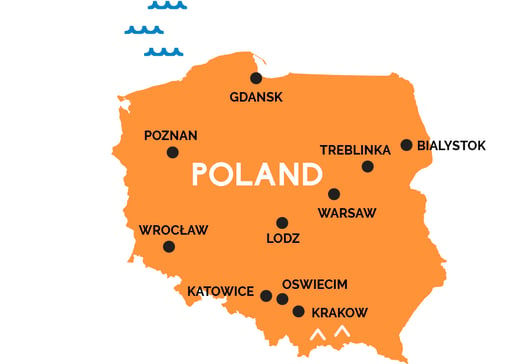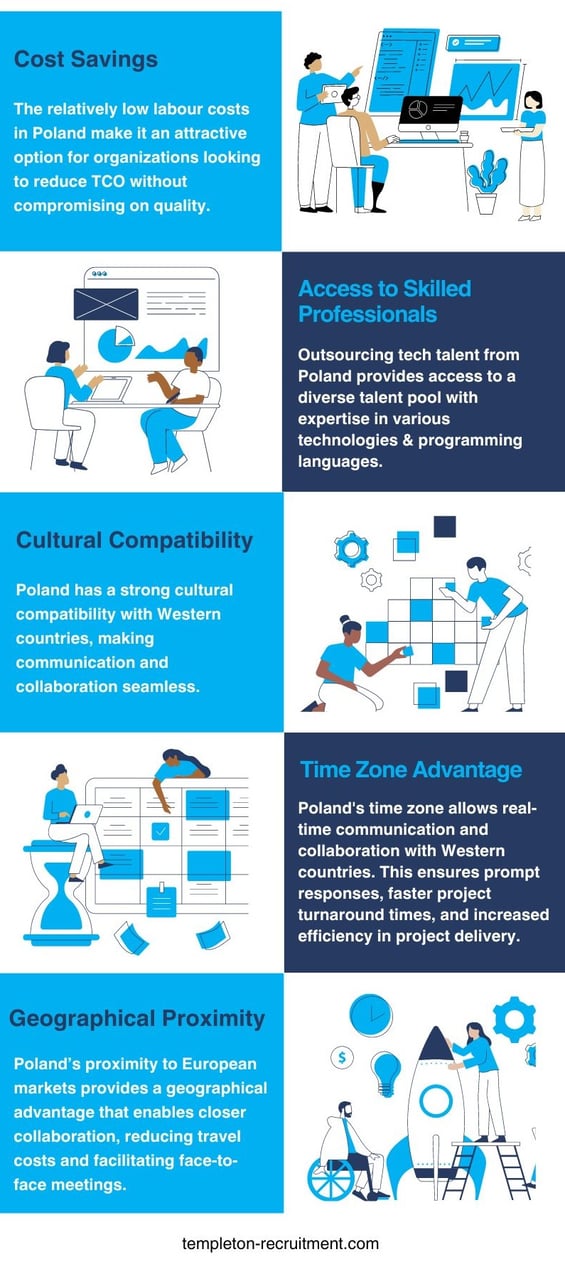Minimising costs and maximising profits is the ultimate goal of any successful business, regardless of size, location, or industry. One key factor in achieving this goal is reducing the total cost of ownership (TCO). But while most organisations focus on saving money by trimming operational expenses, introducing automation, and downsizing, they often overlook a major expense: labour costs.

The total cost of workforce (TCOW) is one of the most important metrics when assessing TCO. It stands as one of the most vital metrics, especially because it often accounts for the highest variable cost for many organisations. Amid this cost-conscious landscape, a compelling strategy emerges – the outsourcing of tech talent, particularly from Poland.
In this article, we will delve into the concept of TCO, explore how outsourcing tech talent can reduce the total cost of ownership, and highlight why Poland is an ideal destination for outsourcing IT professionals.
But first things first…
Understanding Total Cost of Ownership (TCO)
In the realm of business, total cost of ownership (TCO) refers to the overall cost associated with owning and operating an asset throughout its lifetime. TCO provides a more accurate assessment of the value and return on investment (ROI) of an asset, going beyond the initial purchase price and the ongoing operational expenses. It also takes into account various additional expenses such as installation, staff training, transition costs, insurance, servicing, maintenance, repairs, software and updates, security plans, support packages, and more.
The total cost of ownership is particularly relevant when it comes to technology purchases and upgrades. Training staff on new systems and ensuring that existing hardware can support upgraded programs requires a comprehensive TCO analysis. However, this analysis can be applied to any investment to evaluate its long-term costs and benefits accurately.
Breaking down TCO, three main factors should be considered: how much you paid for the item (acquisition price), the ongoing day-to-day expenses (operating expenses), and the costs associated with the people-power needed to keep everything ticking along (manpower costs). In fact, workforce costs, including recruitment and hiring expenses, salaries, incentives, training, and benefits, represent a significant portion of the TCO.
By considering all these factors, TCO provides organisations with a more comprehensive understanding of the true cost and value of their investments, both in assets and human capital. This understanding is a big deal for all kinds of businesses. It's like a superpower decision-making tool. However, according to the ADP Research Institute®, not every business is fully on board – about 60% know about TCO, but only 27% are considering all the factors.
The people behind the scenes are often easy to overlook, but the total cost of a business’s workforce is one of the most vital things to factor into TCO calculations.

Human Capital: The Most Important Factor of TCO
Your workforce isn't just an expense; they're a vital asset that drives your company forward.
Organisations are now increasingly thinking of their employees in terms of “human capital.” The fact that the word “capital” has been attached to the word “human” implies that these organisations recognise the financial impact that their employees have on the bottom line. As financial capital's prominence diminishes as the sole driver of growth, human capital stands poised to take centre stage as a pivotal variable and a catalyst for enhanced productivity and increased profits. It is by far the most abundant, flexible, and readily leveraged resource organisations have.
Given the importance of human capital to any organisation’s operation, it should be carefully managed like any business asset. This starts with how well the asset performs. Surprisingly, most companies do a poor job of managing their human capital from this perspective, despite many thinking that they are doing just fine. However, poor human capital planning and managing can be extremely costly in the form of high employee attrition, the increased need to recruit replacements, and inefficient HR systems and processes.
The Importance of Total Cost of Workforce (TCOW)
In the intricate tapestry of business operations, human capital emerges as a dynamic force, fuelling productivity and propelling profits. Often referred to as Total Cost of Workforce (TCOW), human capital represents a cornerstone in TCO analysis. Beyond the apparent salary and benefits, TCOW encompasses a range of expenses tied to managing and supporting the employees who contribute to an organisation's operations and success. It also includes incentives and other monetary perks, ongoing training and emergency labour for maintenance activities, and even costs tied to the contingent workforce or gig workers engaged with the organisation. These expenses are an integral part of the TCO calculation as they contribute significantly to the overall cost of ownership.
However, understanding the total cost of ownership is not just a financial exercise; it is a critical decision-making tool for enterprises of all sizes and shapes. By embracing the concept of Total Cost of Ownership and incorporating human capital into the TCO analysis, organisations obtain a more realistic picture of what they're actually spending on the procurement and management of their workforce, and – ultimately – gain a deeper understanding of the impact their workforce has on the bottom line. This knowledge enables them to make strategic decisions that optimise their investments and maximise their competitive advantage.
Why Measuring Labour Costs?
In this holistic approach, human capital represents the highest variable cost for most organisations, and managing it effectively is crucial for optimising TCO and achieving cost savings. However, when analysing TCO, many organisations overlook the significant impact of labour costs.
Focusing only on salaries and benefits can be misleading and lead to poor strategic and tactical business decisions. Companies that do only this also risk opportunities. They also should be thinking about the costs associated with managing these areas and other functions like talent management, time and attendance, as well as the costs associated with the systems and processes to support these activities.
With labour costs accounting for as much as 70% of an organisation's total operating expenses, TCOW becomes a key insight companies need to keep track of. What’s more, the trajectory of manpower costs is projected to significantly increase during the upcoming decade, pushed up by various workforce trends, such as the rising minimum wage, the escalating costs for highly skilled positions and sought-after talent, and the demand for more transparency in human capital management.
With all these in mind, grasping the nuances of TCO becomes paramount for organisations to make informed choices that harness their workforce's potential and reap numerous other benefits, such as lower employee attrition rates, reduced recruitment and training costs, improved productivity, and enhanced overall performance. By recognising the importance of human capital and allocating resources to manage it effectively, organisations can gain a competitive advantage in their respective industries.

Reducing the Total Cost of Ownership by Outsourcing Tech Contractors
In today's business landscape, organisations are constantly seeking ways to minimise costs and maximise efficiency. One area where significant savings can be achieved is in labour spend, and balancing the use of permanent and contingent workers is a crucial aspect of cost management. According to a report by Gartner, 32% of organisations are replacing full-time employees with contractual workers as a cost-saving measure. This trend highlights the growing appeal of temporary labour for businesses worldwide.
For many companies looking to add more flexibility to their workforce or save costs through their existing contingent workers, outsourcing tech contractors can be a viable solution. Hiring independent contractors or casual staff can provide relief during peak periods without incurring unnecessary costs. These workers are paid only for the work they do, allowing you to control costs more effectively. Unlike regular staff, independent contractors and casual staff don't have contracted hours or require the same entitlements, making them a cost-efficient choice during fluctuating workloads.
The Cost of Contractors vs. Permanent Staff
One common misconception is that contractors are expensive compared to permanent staff. While a contractor's daily rate may initially seem higher, it's essential to consider the long-term financial impact. Permanent staff members come with additional costs, such as hiring, training, and infrastructure. In contrast, contractors offer flexibility and can hit the ground running, driving productivity from day one. According to industry experts, contractors have minimal or zero employment overheads, making them an attractive option for cost-conscious enterprises.
Calculating Contractor Total Spend
To effectively manage the costs associated with a contingent workforce, it's important to understand how to calculate the contractor's total spending figure. Breaking down the costs into three main areas can provide valuable insights:
- Supply Chain: This includes contractor attraction and sourcing, vetting and compliance management, timesheet management, payrolling, and agency margin. Typically, the supply chain accounts for less than 20% of the total cost.
- Contractor Base: This includes the pay to the contractor, taxes, expenses, and insurance. This category represents the remaining 80% of the known costs.
- Hidden Costs and Opportunities: This portion encompasses factors such as project delivery time, productivity and efficiency per hour, incremental or pass-through of risk, management time, and investment. While quantifying these costs can be challenging, they often present significant opportunities for cost savings and revenue enhancement.
It's crucial to recognise that over 80% of the total cost of ownership is tied up within the aggregated pay rates of the contractors. By effectively managing this aspect, organisations can unlock significant cost savings. The hidden costs and opportunities section, although harder to define and quantify, can be comparable in value to the contractor costs themselves.

Additional Benefits of Hiring Tech Contractors
Beyond cost savings, outsourcing tech contractors offers numerous additional benefits, including:
- Ease of Separation: With political and economic uncertainties, committing to permanent staff can be daunting. Hiring contractors allows access to needed skills without long-term commitments.
- Cost and Time Savings: Contractors have lower overheads, as there are no payroll taxes, paid leave, or pension obligations. This reduces administrative burdens and eliminates the need for elaborate induction or appraisal processes.
- Flexibility: Contractors can be tailored to specific project requirements, allowing organisations to adjust workforce capacity according to fluctuating demands. They are particularly useful for managing digital transformation activities.
- Specialist Skills for Project Work: Contractors bring specialised expertise to one-off projects, change management initiatives, and the implementation of disruptive technologies. Their skill sets can be instrumental in driving project success.
- Easing Workload for Permanent Staff: By leveraging contractors, organisations can free up their permanent staff's time and enable them to focus on core business activities, enhancing overall productivity.
- Quick Onboarding: Contractors can be onboarded swiftly, even when a large number of people are required. This agility allows businesses to address urgent needs promptly.
- Temporary Cover: When permanent staff members are absent due to illness, sabbatical, or maternity leave, contractors can step in seamlessly, ensuring business continuity.
- Budget Certainty: Hiring contractors provides defined costs and time frames from the outset, allowing for better budget planning and control.
- Outside Perspective: Contractors offer a fresh perspective, unencumbered by internal biases or company politics. Their objective viewpoint can lead to transformative changes in how a business operates.
- Trial Run: Hiring a contractor provides an opportunity to assess their compatibility with the company. If they prove to be an excellent fit, a permanent contract can be offered.
By harnessing the advantages of outsourcing tech contractors, businesses can not only reduce their total cost of ownership but also gain access to specialised skills, flexibility, and fresh perspectives.

With the dynamic nature of today's business environment, organisations need to explore innovative ways to optimise their workforce and reduce costs. Outsourcing tech contractors can be a strategic approach to achieve these goals – and when it comes to outsourcing tech talent, one country that stands out is Poland.
But why Poland?
What makes Polish tech talent so appealing to companies looking to expand their global capabilities?
Why Is Poland an Attractive Destination for Global Companies
The global tech industry is constantly evolving, and companies are always on the lookout for new opportunities and talent. In recent years, Poland has emerged as a rising star in the global tech market, attracting attention and investment from major players around the world. With its highly skilled and affordable tech talent, the country offers numerous advantages for businesses seeking to tap into its vibrant IT market.
Below, we will explore some of the factors that contribute to the country’s growing status as a key location in the global tech landscape.
Poland: One of the Best Tech Hubs in Europe
Boasting the largest IT talent pool in Central Eastern Europe, Poland has become a key location for technology companies building regional or global teams. Adding to its impressive industry rankings and dynamic ecosystem, Poland has firmly established itself as a powerhouse in the global technology arena.
The allure of Poland's tech prowess has attracted a spectrum of enterprises, from tech giants to agile startups, to establish their presence within its borders. Cities like Krakow, Warsaw, Wroclaw, Poznan, and the Tri-city metropolitan area of Gdansk, Gdynia, and Sopot have become havens for innovation and research and development (R&D) centres.
This continuous growth and diversification of the ecosystem, combined with the constant flow of high-quality talent, means that Poland’s appeal – to both hiring companies and candidates looking to pursue careers in technology – goes from strength to strength.
The nation's robust educational infrastructure is one major factor for the steady influx of skilled technology workers. Polish programmes and software engineers are recognised as some of the best in the world – a status confirmed in rankings by respected organisations like HackerRank and Stack Overflow.
Poland's strategic positioning within the realm of remote work has further elevated its advantage. The "hire anywhere" trend, accelerated by the pandemic, has facilitated seamless access to Polish IT professionals for international corporations. Notably, an Emerging Europe Report positions Poland among the top three competitive markets for the IT industry in Central and Eastern Europe, showcasing its competitiveness across various categories. The country excelled in education and employee preparation, receiving top honours in that classification.
This reputation, combined with favourable costs, the high number of technical institutions, and an abundance of talent, makes Poland a leading destination for companies looking to expand their digital capabilities and build the best tech teams.
The Polish IT Market in Numbers
Poland has made significant strides in establishing itself as a leading destination for tech companies. The country boasts a thriving IT industry, with impressive figures that showcase its potential:
- The Polish IT industry ranks among the top in Europe, with a revenue of $10.4 billion and exports of $8.6 billion. It continues to expand at a steady rate of 5% to 10% per year.
- The tech sector contributes 8% to the Polish GDP and employs a significant portion of the workforce, accounting for 6% of total employment.
- There are over 65,000 tech businesses in Poland, including more than 3,000 startups and 10 unicorns.
- Poland is consistently recognised as one of the best countries for IT offshoring, according to various surveys and rankings.
- The country offers a favourable business environment and high financial attractiveness, as acknowledged by the Kearney Global Services Location Index.
These numbers demonstrate the strength and potential of the Polish IT market, making it an attractive choice for companies seeking to expand their teams and operations.

Abundance of Skilled IT Professionals
One of the key factors that make Poland attractive to tech companies is its large pool of highly skilled IT professionals. The country boasts the largest IT workforce in the Central and Eastern Europe region, with over 500,000 IT specialists. Additionally, with more than 16,000 ICT graduates every year and a constant inflow of talent from neighbouring countries, the IT talent pool in Poland continues to grow. This growth is mirrored by the number and diversity of new hiring companies arriving on the scene. This constant evolution ensures that the tech scene continues to thrive and become more diverse, creating new opportunities for candidates and companies alike.
Polish tech professionals are known for their superb expertise and diverse skill sets. They excel in popular technologies such as JavaScript, SQL, Python, HTML/CSS, and Typescript. Moreover, they stay up-to-date with the latest advancements in cloud computing, AI and ML, Big Data analytics, and system automation.
Beyond technical skills, Polish developers possess advanced interpersonal skills, making them a pleasure to work with. They exhibit flexibility, dedication, problem-solving abilities, and effective communication skills. Polish programmers are also highly proficient in English, with 90% of them having excellent English language skills. This proficiency in both technical and soft skills sets Polish tech talent apart and makes them valuable assets to any organisation.
Optimal Price-to-Quality Ratio
In addition to its talent pool, Poland continues to be affordable, especially when considering the high quality of talent. In fact, the country offers an optimal price-to-quality ratio for companies across the globe, and hiring Polish developers can even result in significant cost savings compared to other countries. The average salary of a Polish programmer, for instance, ranges from $38,000 to $60,000, making it more affordable for companies to build their software development teams. Amid volatility and skills shortages elsewhere, Poland provides quality, availability, and affordability for conducting business.
Not only are salaries competitive, but tax rates for Polish programmers are also favourable. Those employed on a business-to-business (B2B) basis pay an income tax of 8.5% to 12%. This combination of affordable salaries and favourable tax rates allows companies to maximise their budget while still accessing top-notch talent.
Strategic Location and Time Zone Advantage
Poland's geographical location is another advantage for companies looking to establish their presence or expand their tech teams in the country. Situated in the heart of Europe, Poland serves as a gateway between Western and Eastern European IT centres. This strategic location enables seamless collaboration between in-house teams and remote teams in other European countries.
Furthermore, Poland operates in the Central European Time Zone, which aligns with most Western European countries. This eliminates the challenges of working across different time zones and ensures smooth and efficient communication between teams.
What’s more, remote work was marked as the most popular location for work in Poland. According to a survey by NoFluffJobs, in 2021, there were 260% more remote job offers than in 2020. Polish IT specialists value the comfort of working from any place in the world, and this was reflected in the posted job offers. Remote opportunities presented one-third of all postings, leaving Warsaw far behind in second position (23.2% of the share).
Developed IT Powerhouses
Poland's tech scene is not concentrated in a single city but spread across several key IT powerhouses. These cities offer a wealth of talent and resources for tech companies:

Warsaw
- The capital and largest tech powerhouse in Poland.
- Home to 103,000 IT experts and 3,000 ICT graduates annually.
- Recognised as one of the top ten major European cities for future investments and R&D establishments.
Krakow
- The second-largest IT hub in Poland, with over 56,000 programmers.
- Boasts a highly business-friendly environment and hosts R&D offices of tech giants like Google, IBM, and Cisco.
Wroclaw
- Known as the Polish Silicon Valley, with 52,000 tech professionals.
- Home to over 200 tech companies and major players such as IBM, Accenture, and Nokia.
Katowice
- Accounts for 40,000 tech specialists and hosts over 180 IT businesses.
- Recognised as one of the most technologically advanced cities in Poland.
Poznan
- Houses a pool of approximately 30,000 tech experts.
- Ideal for SMEs and startups, with around 80 IT companies operating in the city.
Tri-City (Gdansk, Gdynia, and Sopot)
- A metropolitan area with 35,000 IT professionals.
- Attracts companies like Amazon, Intel, and Nike, which have already established offices in the region.
The presence of these developed IT powerhouses ensures that companies have access to a large and diverse talent pool, making it easier to find the right professionals for their specific needs.
Data Security and GDPR Compliance
The protection of intellectual property and data security are crucial considerations for tech companies. Poland ensures data security for foreign businesses by being compliant with the General Data Protection Regulation (GDPR). As a member of the European Union, Poland adheres to the GDPR, safeguarding personal data and guaranteeing the right to data portability. This commitment to data protection provides companies with peace of mind and ensures the security of their valuable assets.
Cultural Fit
Poland shares historical and cultural ties with countries like Germany, Austria, Sweden, France, Ireland, the UK and the US, and the Poles tend to be naturally open, curious, and keen to acquire experience working abroad or in an international setting. These qualities make Polish IT professionals ideally suited to working for global companies.
The Benefits of Outsourcing Tech Talent from Poland
Outsourcing tech talent has emerged as a popular strategy for reducing TCO, and Poland has established itself as a leading destination for IT outsourcing due to several key factors:

The Future of Outsourcing Polish Tech Talent
Poland is recognised as the second most attractive market globally for outsourcing IT services, according to a GBS World ranking. Moreover, according to Gartner data, it is predicted that in 2023, IT outsourcing will be the fastest-growing area related to software development.
As more and more international companies invest in Poland and the Polish tech talent, the market matures, the talent pool diversifies, and the level of comfort grows. As a result, the range of roles sought after is expanding beyond strictly technical positions. In addition to software engineers and IT specialists, positions like business analysts, product owners, product managers, scrum masters, and DevOps professionals are in high demand.
Moreover, the Polish ICT sector is experiencing rapid growth, with qualities like creativity, project experience, soft skills, proficiency in multiple programming languages, and commitment being highly valued in IT industry recruits. The evolving ecosystem, coupled with the constant influx of high-quality talent, creates attractive opportunities for both candidates and companies.
Now Is the Best Time to Invest in Poland
Poland's rise as a key location in the global tech market is a testament to the country's strong IT industry and abundant talent pool. Organisations looking to expand their global capabilities can find exceptional opportunities in Poland, whether it's building software development teams, outsourcing IT services, or investing in the country's growing tech ecosystem. With its stellar reputation and continued growth, Poland is undoubtedly a rising star in the global tech market.
So why wait?

Templeton and Partners have recruited IT specialists in Poland since 2012. We provide scalable, specialist technology resources at short notice and across multiple client sites. Speed and service quality are our priorities. As the global recruitment team building global IT teams for global customers, we find skilled tech professionals, whenever and wherever required. Get in touch with us to explore the possibilities and tap into the vast pool of Polish tech talent.




